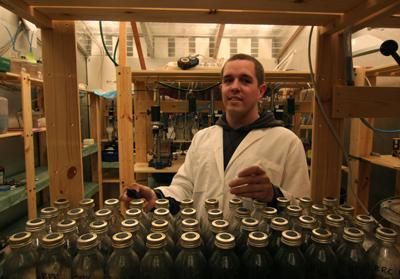Evaluation of wetland plants as a source for biogas production after mechanical, alkaline and fungal pretreatments.

Backround
Biogas is a promising biofuel that can be produced from a wide range of organic material. However, more substrates are needed if biogas is to befome a major alternative to fossile fuels. We raised the question if wetlands can be harvested to provide the biogas industry with more substrate and simultaniusly maintain their role as nutrient sinks, preventing eutrophication. However, wetland plants contain some lignin and are relativly hard to degrade. Therefore three pretreatments were evaluated to break the protective structure of the plants that inhibit anaerobic digestion. There are hardly any methane potentials for wetland plants and the combination with these pretreatments has never been done before.
Method
Two species of wetland plants, Thypha latifolia and Phalaris arundinacea, were collected at a small wetland. The plants were dried and cut to small pieces. Pretreatments were carried out prior to bach digestion. Milling: plants grinded to fine powder. Alkaline: Plants mixed with lime to highly alkaline solution for 24 h. Fungal: oyster muchroom growing on the plant material for 42 days, degrading structural carbohydrates and lignin. The plants material was put in bottles toghether with water, inoculum and nutrients under anaerobic conditions, Bottles were placed in a 37 C degree climate room and methane production was monitored over time.
Results
The total methane yeild for both wetland species where 295 ml of methane per g VS by avarage and there where no clear difference betwwn the two species. Milling pretreatments increased the biogas yeild with 16,4 % by averge. Alkaline pretreatment increases the biogas yeild with 27% at room temp and 21.8 % at 55 C degreees. The fungal pretreatments decreased the biogas production by 19,9 %.
Conclusion and future prospects
The production of 295 ml methane is a decent yeild, similar to other grasses and plants previusly tested for methane potential. Pasture crops have a similar yeild and are already used in large scale reactors. This type of substrates can be used in co-digestion with other substrates such as manure in farm scale reactors. However, mechanical problems can arise in the reactors dealing with grasses and plants. Therefore some king of milling is necesary. This thesis confirms that milling also raises the production. Alkaline pretreatment raises the production but the chemiclas are costly. Fungal pretreatments did not work for this kind of species. It is possible that it is suitable to apply to hardwood species that are more resistant by nature. Now economical assesments mus be made considering both the harvest and the plants as well the cost for the pretretmants. This can in tur tell if it is worth producing biogas from wetland plants and wich pretreatmetns to use.

Contact
Simon Alvinge
Tfn: +46(0)704545288
email: simal769@student.liu.se
Responsible for this page:
Director of undergraduate studies Biology
Last updated:
06/02/10
